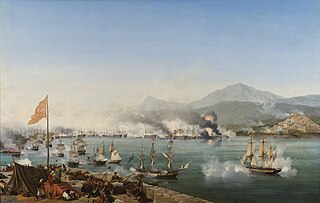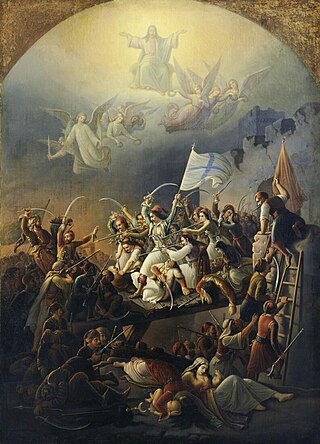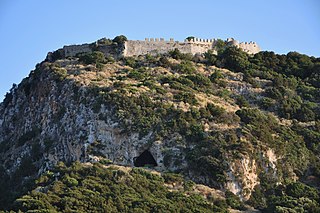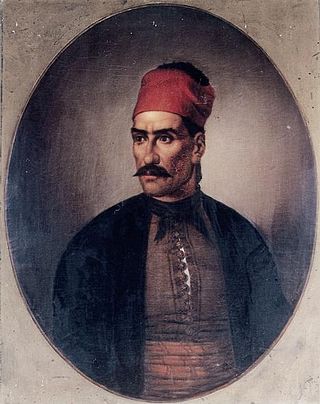
Pylos, historically also known as Navarino, is a town and a former municipality in Messenia, Peloponnese, Greece. Since the 2011 local government reform, it has been part of the municipality Pylos-Nestoras, of which it is the seat and a municipal unit. It was the capital of the former Pylia Province. It is the main harbour on the Bay of Navarino. Nearby villages include Gialova, Pyla, Elaiofyto, Schinolakka, and Palaionero. The town of Pylos has 2,568 inhabitants, the municipal unit of Pylos 4,559 (2021). The municipal unit has an area of 143.911 km2.

The Battle of Navarino was a naval battle fought on 20 October 1827, during the Greek War of Independence (1821–1829), in Navarino Bay, on the west coast of the Peloponnese peninsula, in the Ionian Sea. Allied forces from Britain, France, and Russia decisively defeated Ottoman and Egyptian forces which were trying to suppress the Greeks, thereby making Greek independence much more likely. An Ottoman armada which, in addition to Imperial warships, included squadrons from the eyalets of Egypt and Regency of Algiers and Tunis, was destroyed by an Allied force of British, French and Russian warships. It was the last major naval battle in history to be fought entirely with sailing ships, although most ships fought at anchor. The Allies' victory was achieved through superior firepower and gunnery.

The Greek War of Independence, also known as the Greek Revolution or the Greek Revolution of 1821, was a successful war of independence by Greek revolutionaries against the Ottoman Empire between 1821 and 1829. In 1826, the Greeks were assisted by the British Empire, Kingdom of France, and the Russian Empire, while the Ottomans were aided by their vassals, especially by the Eyalet of Egypt. The war led to the formation of modern Greece, which would be expanded to its modern size in later years. The revolution is celebrated by Greeks around the world as independence day on 25 March.

The Ottoman–Egyptian invasion of Mani was a campaign during the Greek War of Independence that consisted of three battles. The Maniots fought against a combined Egyptian and Ottoman army under the command of Ibrahim Pasha of Egypt.

The Battle of Phaleron or Battle of Analatos took place on 6 May 1827, during the Greek War of Independence. The Greek rebel forces were being besieged inside the Acropolis of Athens by Ottoman forces under the command of Mehmed Reshid Pasha. Greek forces outside the city were desperately trying to break the siege.

The Third Siege of Missolonghi was fought in the Greek War of Independence, between the Ottoman Empire and the Greek rebels, from 15 April 1825 to 10 April 1826. The Ottomans had already tried and failed to capture the city in 1822 and 1823, but returned in 1825 with a stronger force of infantry and a stronger navy supporting the infantry. The Greeks held out for almost a year before they ran out of food and attempted a mass breakout, which however resulted in a disaster, with the larger part of the Greeks slain. This defeat was a key factor leading to intervention by the Great Powers who, hearing about the atrocities, felt sympathetic to the Greek cause. Their support would prove decisive in helping the Greeks win the war and gain independence.

Methoni, formerly Methone or Modon, is a village and a former municipality in Messenia, Peloponnese, Greece. Since the 2011 local government reform it is part of the municipality of Pylos-Nestor, of which it is a municipal unit. The municipal unit has an area of 97.202 km2. Its name may be derived from Mothona, a mythical rock. It is located 11 km south of Pylos and 11 km west of Foinikounta. The municipal unit of Methoni includes the nearby villages of Grizokampos, Foinikounta, Foiniki, Lachanada, Varakes, Kainourgio Chorio, Kamaria, Evangelismos, and the Oinnoussai Islands. The islands are Sapientza, Schiza, and Santa Marina; they form a natural protection for Methoni harbour.

The First Egyptian–Ottoman War or First Syrian War (1831–1833) was a military conflict between the Ottoman Empire and Egypt brought about by Muhammad Ali Pasha's demand to the Sublime Porte for control of Greater Syria, as reward for aiding the Sultan during the Greek War of Independence. As a result, Egyptian forces temporarily gained control of Syria, advancing as far north as Kütahya.

The Battle of Dervenakia was the Greek victory over the Ottoman forces on 6–8 August 1822, an important event in the Greek War of Independence.

The Morea expedition is the name given to the land intervention of the French Army in the Peloponnese between 1828 and 1833, at the time of the Greek War of Independence, with the aim of expelling the Ottoman-Egyptian occupation forces from the region. It was also accompanied by a scientific expedition mandated by the French Academy.

The Battle of Sphacteria took place during the Greek War of Independence on 8 May 1825 in Sphacteria between the Egyptian forces of Ibrahim Pasha and Greek forces led by Captain Anastasios Tsamados along with Alexandros Mavrokordatos.

The Battle of Peta or Battle of Petta was fought between the Greeks led by Alexandros Mavrokordatos with Markos Botsaris and the Ottomans led by Omer Vrioni on 16 July 1822. The conflict occurred on a hillside near the village of Peta in Epirus.

The Old Navarino castle is a 13th-century Frankish fortress near Pylos, Greece. It is one of two castles guarding the bay on which it sits; the other is the Ottoman-built New Navarino. It is frequently known simply as Palaiokastro or Paliokastro. It occupies the site of the Athenian fort at the 425 BC Battle of Pylos.

The brig Aris, was one of the most distinguished Greek ships during the Greek War of Independence and continued to serve in the Greek Navy until the early 20th century as a training ship.

Anastasios Tsamados was a Greek admiral of the Greek War of Independence. He was the famous captain of the brig Aris and an admiral who led a naval squadron under Andreas Miaoulis. Anastasios Tsamados was the first to rush to the Greek island of Chios and attack the naval warships of the Kapudan Pasha during the massacre of Chios. He also fought in the naval battle of Patras (1822) and died heroically during the famous Battle of Sphacteria.
Kyriakos Skourtis was a captain from Hydra Island, who participated in the Greek Revolution of 1821. He is known mainly for his appointment as commander of the land forces by the government of Georgios Kountouriotis in 1825, although he was a naval officer and completely inexperienced at land.

The fortress of New Navarino is an Ottoman fortification near Pylos, Greece. It is one of two castles guarding the strategic Bay of Pylos, on which it sits; New Navarino is located in the southern entrance of the bay, while the northern entrance is guarded by the 13th-century Old Navarino castle, built by the Crusaders of the Principality of Achaea. In juxtaposition with the latter, New Navarino is often known simply as Neokastro or Niokastro.

The Ministry for Naval Affairs was a government department of Greece responsible for matters pertaining to the Greek Navy as well as the Greek Merchant Marine Ministry.

Nasuhzade Ali Pasha, commonly known as Kara Ali Pasha, was an Albanian admiral of the Ottoman navy during the early stages of the Greek War of Independence. In 1821, as second-in-command of the Ottoman navy, he succeeded in resupplying the isolated Ottoman fortresses in the Peloponnese, while his subordinate Ismael Gibraltar destroyed Galaxeidi. Promoted to Kapudan Pasha, and led the suppression of the revolt in Chios and the ensuing Chios massacre in April 1822. He was killed when a fireship captained by Konstantinos Kanaris blew up his flagship in Chios harbour on the night of 18/19 June 1822.

Domna Visvizi was a Greek maritime captain who fought in the Greek War of Independence. At the outbreak of the war, Visvizi joined her husband Chatzi Antonis Visvizis to fight for the Greek cause onboard the ship Kalomoira. After her husband was killed in battle in July 1822, Visvizi took command of the ship and continued to fight in the war. Among other contributions, Visvizi aided in the Greek capture of the island of Euboea. After running low on funds and being rejected additional funding by the Greek leadership, Visvizi gave over the Kalomoira to the Greek navy in 1824. After the war she was left destitute and with next to no government support lived in poverty until her death in 1850.


















